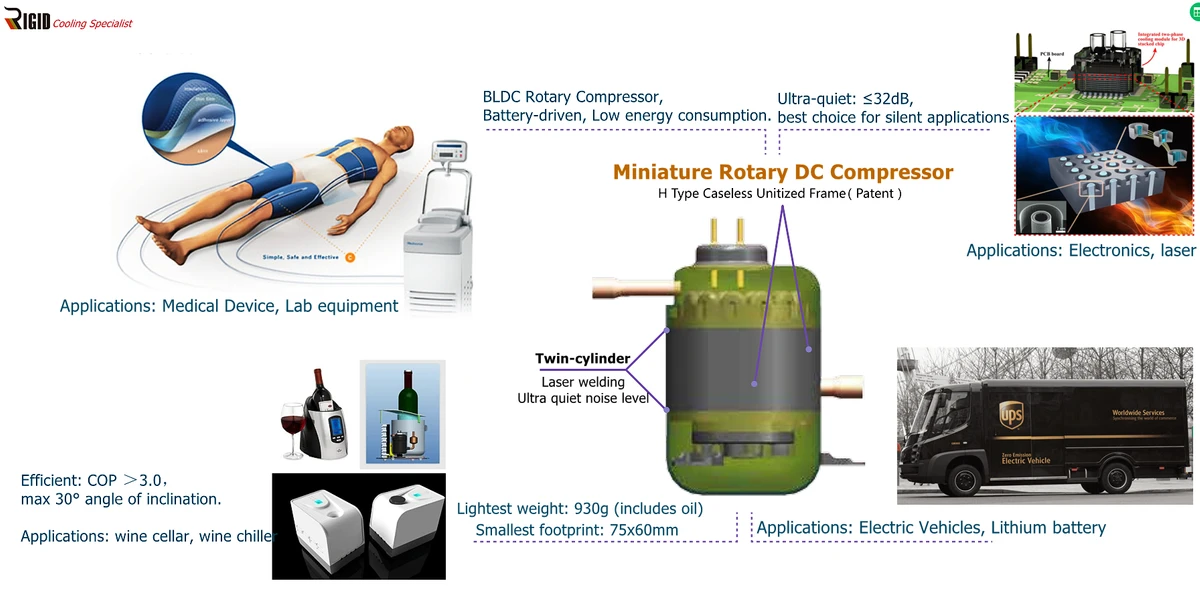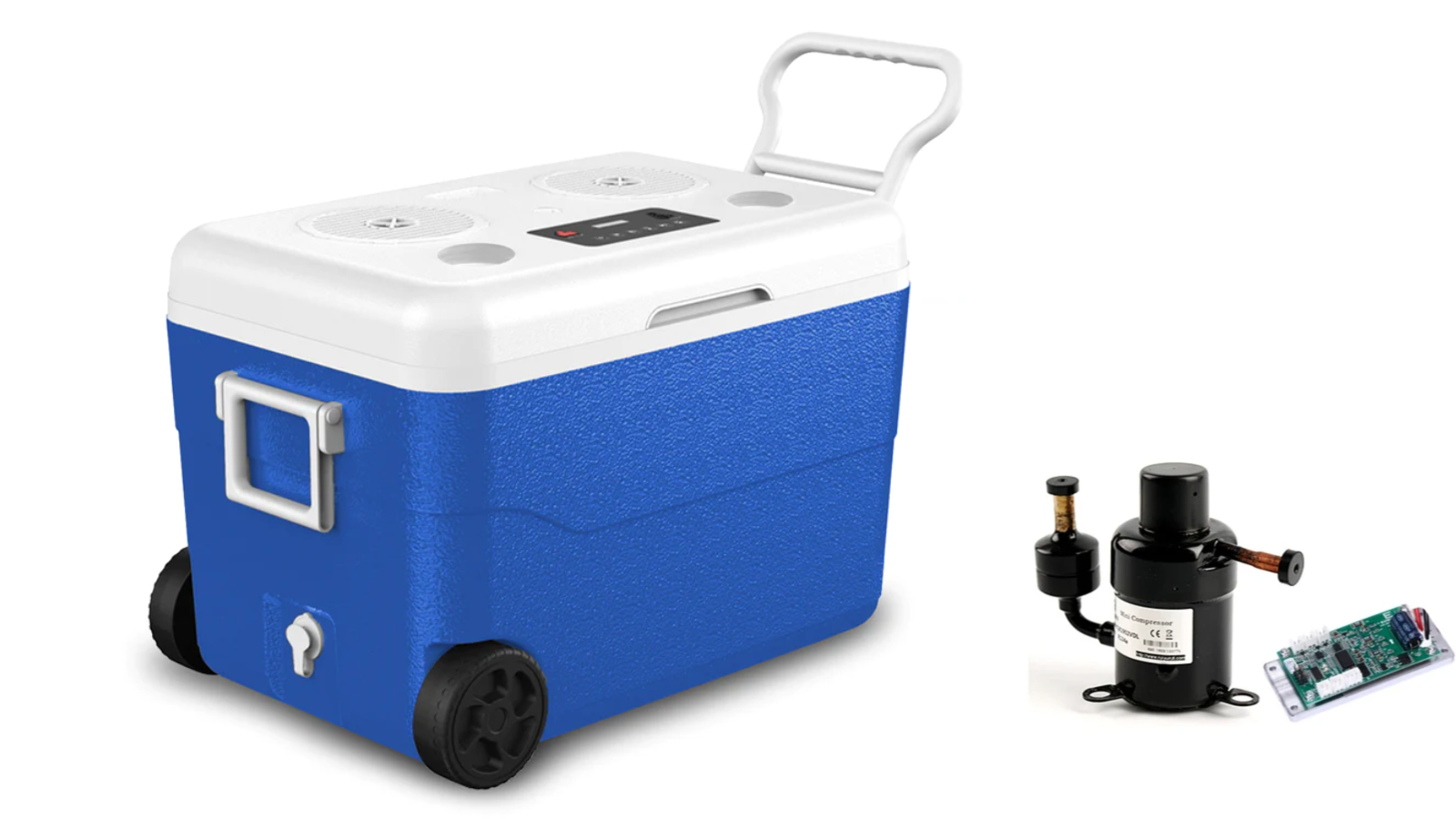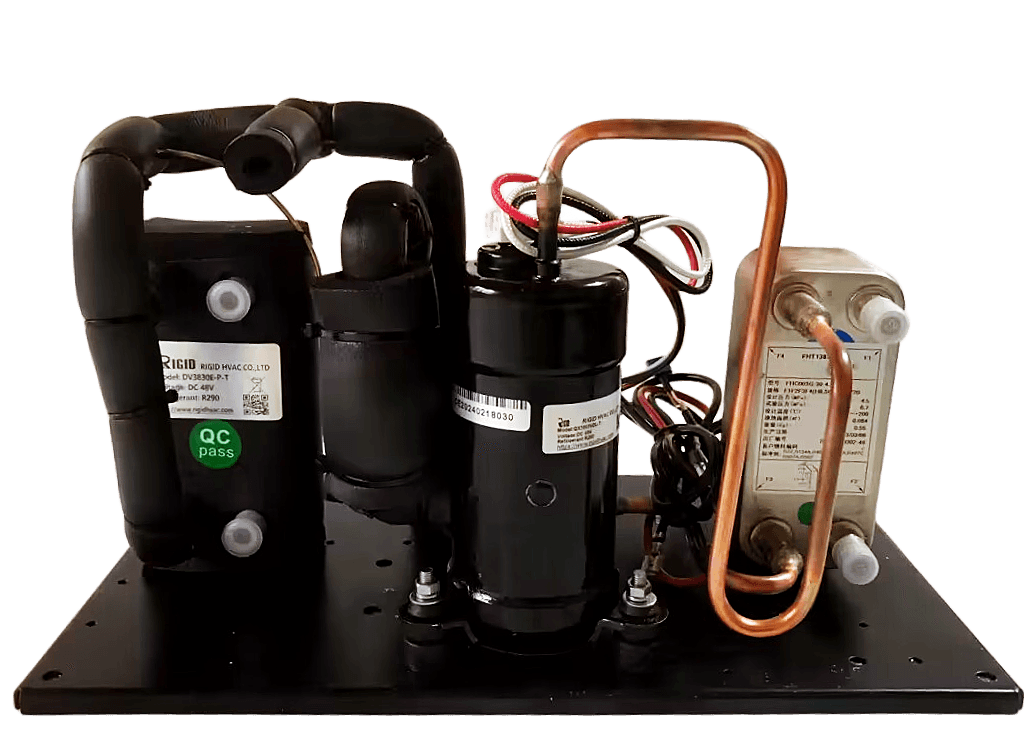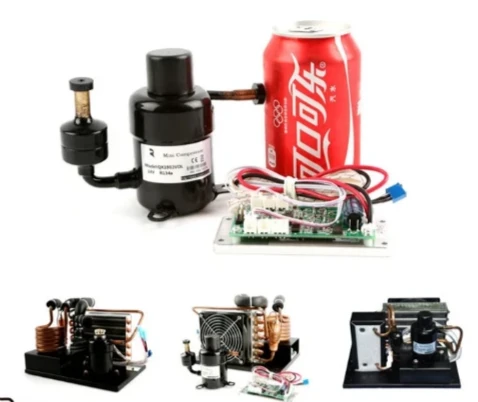Introduction

"RIGID is a miniature refrigerated compressor innovation leader in China. We keep looking for novel solutions in compact and portable cooling systems. We capture new technologies in mobile and compact cooling systems."
In an era where environmental consciousness is paramount, the role of green gases in cooling systems has never been more critical. These eco-friendly alternatives are reshaping the landscape of compressor cooling, providing sustainable solutions that reduce carbon footprints while maintaining efficiency. As industries seek to balance performance with environmental responsibility, the transition from natural to synthetic refrigerants becomes a pivotal focus.
The Role of Green Gases in Cooling
Green gases, such as natural refrigerants, play a vital role in modern cooling technologies by drastically lowering greenhouse gas emissions compared to traditional options. Utilizing these environmentally friendly substances not only helps combat climate change but also enhances energy efficiency within compressor cooling systems. As regulations tighten and public awareness grows, embracing green gases is essential for a sustainable future.
RIGID's Innovative Approach
RIGID stands at the forefront of this revolution with its innovative approach to compressor cooling technologies. By integrating key technologies for compressor cooling with green gases, RIGID is pioneering solutions that prioritize both performance and sustainability. Their commitment to combining compactness and sustainability ensures that their products not only meet industry demands but also contribute positively to our planet’s health.
The Future of Compressor Cooling
Looking ahead, the future of compressor cooling appears bright as advancements continue to emerge in both technology and materials used in refrigeration systems. The ongoing evolution from natural to synthetic refrigerants will likely offer even more efficient options while reducing environmental impact further. With companies like RIGID leading the charge, we can expect a new standard for compressor power supply that embodies energy efficiency and ecological integrity.
Understanding Compressor Cooling Systems

Compressor cooling systems are at the heart of many refrigeration and air conditioning applications, playing a crucial role in maintaining desired temperatures. These systems work by compressing refrigerants, which absorb heat from the environment and release it elsewhere, effectively cooling indoor spaces or preserving perishable goods. As we delve into the intricacies of compressor technology, we will explore its significance in energy efficiency and environmental sustainability.
Basics of Compressor Technology
At its core, compressor technology involves the mechanical process of increasing the pressure of a gas to facilitate heat transfer. Compressors come in various types—reciprocating, rotary screw, and scroll compressors being among the most common—each with unique characteristics suited for different applications. Understanding these variations is essential for selecting the right compressor cooling solution that balances performance with energy consumption.
The operation of these compressors relies heavily on refrigerants, which can be natural or synthetic. Natural refrigerants like ammonia and carbon dioxide are gaining traction due to their low global warming potential (GWP), while synthetic options often provide better efficiency but can contribute to ozone depletion if not managed properly. The ongoing shift from natural to synthetic refrigerants reflects an industry-wide effort to embrace greener technologies while optimizing compressor performance.
Importance of Efficient Cooling
Efficient cooling is paramount in both commercial and residential settings as it directly impacts energy consumption and operational costs. An efficient compressor cooling system can significantly reduce electricity bills while minimizing carbon footprints—a win-win for both business owners and environmentally conscious consumers alike. By adopting advanced technologies that enhance efficiency, companies can meet regulatory standards while also appealing to a market increasingly focused on sustainability.
Moreover, efficient cooling systems contribute to prolonged equipment lifespan through reduced wear and tear on components like compressors themselves. This not only saves money on replacements but also leads to fewer disruptions in service—a critical factor for industries relying heavily on refrigeration or climate control systems. As such, investing in efficient compressor technology is not just about immediate savings; it's about future-proofing operations against rising energy costs.
Environmental Impact of Cooling Solutions
The environmental impact of cooling solutions cannot be overstated; traditional refrigerants have been linked to ozone layer depletion and significant greenhouse gas emissions. Transitioning towards more sustainable options—such as those outlined under the From Natural to Synthetic Refrigerants framework—can drastically lower these negative effects associated with compressor cooling technologies. Emphasizing green gases within this context allows manufacturers like RIGID to lead by example while encouraging broader industry shifts toward eco-friendly practices.
Furthermore, understanding this impact helps consumers make informed choices when selecting products that utilize compressor cooling systems. By prioritizing solutions that integrate Key Technologies for Compressor Cooling with Green Gases, users can support sustainable practices without sacrificing performance or comfort levels in their environments. Ultimately, embracing environmentally friendly alternatives contributes positively not just to individual businesses but also fosters a collective responsibility towards our planet's health.
From Natural to Synthetic Refrigerants

The evolution of refrigerants has been a pivotal aspect in the realm of compressor cooling. Understanding the spectrum from natural to synthetic refrigerants helps us grasp their roles in enhancing energy efficiency and sustainability. As we navigate this transition, it’s crucial to highlight the key technologies that are shaping compressor cooling solutions today.
Overview of Refrigerant Types
Refrigerants can be broadly categorized into natural and synthetic types, each with unique properties and applications in compressor cooling systems. Natural refrigerants include substances like ammonia, carbon dioxide, and hydrocarbons, which have been used for decades due to their low environmental impact. On the other hand, synthetic refrigerants such as hydrofluorocarbons (HFCs) have gained popularity for their effective thermodynamic properties but often come with concerning environmental footprints.
While synthetic options may boast high efficiency ratings, they typically contribute significantly to greenhouse gas emissions when leaked into the atmosphere. This has sparked a global movement towards adopting more sustainable alternatives that align with modern environmental standards. Thus, understanding these refrigerant types is essential for advancing our approach to compressor cooling technologies.
Advantages of Natural Refrigerants
Natural refrigerants present numerous advantages that make them increasingly attractive in compressor cooling applications. Firstly, they are generally non-toxic and have negligible ozone depletion potential (ODP), making them safer for both humans and the environment compared to many synthetic options. Additionally, natural refrigerants often exhibit superior thermodynamic performance, leading to lower energy consumption—an essential factor when considering energy efficiency in cooling systems.
Moreover, using natural refrigerants aligns perfectly with RIGID's commitment to sustainability by minimizing reliance on harmful substances while maximizing performance through innovative designs. The integration of these eco-friendly solutions not only enhances operational efficiency but also addresses regulatory pressures aimed at reducing greenhouse gas emissions from traditional refrigeration methods. In this context, embracing natural refrigerants is a step toward a more sustainable future for compressor cooling technologies.
Transitioning to Synthetic Options
While there is a strong push towards utilizing natural refrigerants in compressor cooling systems, transitioning to synthetic options can also be beneficial under certain circumstances. Some advanced synthetic compounds are engineered specifically to reduce global warming potential (GWP) while still delivering impressive performance metrics required by modern industries. This creates a middle ground where companies can leverage key technologies for compressor cooling with green gases without completely abandoning synthetic solutions.
As industries adapt their practices and regulations evolve globally, finding balance becomes essential; thus transitioning responsibly involves careful consideration of both types of refrigerants based on application needs and environmental impacts. The shift may involve retrofitting existing systems or developing new ones that optimize both compactness and sustainability while ensuring compliance with evolving standards around GWP limits set forth by governing bodies worldwide.
In conclusion, understanding the landscape from natural to synthetic refrigerants opens doors for innovation within compressor cooling technology—allowing us not only to meet current demands but also prepare for future challenges related to climate change and resource management.
Key Technologies for Compressor Cooling with Green Gases

In the ever-evolving landscape of compressor cooling, key technologies are emerging that leverage green gases to enhance efficiency and sustainability. These advancements not only improve the performance of cooling systems but also align with global efforts to reduce environmental impact. As industries transition from traditional refrigerants to greener options, the spotlight shines on innovative solutions that promise a cooler future.
Innovations in Mini Compressors
Mini compressors are revolutionizing compressor cooling by offering compact solutions without sacrificing performance. These small powerhouses utilize advanced engineering to deliver efficient cooling while minimizing energy consumption, making them ideal for various applications. With their ability to operate effectively with both natural and synthetic refrigerants, mini compressors exemplify the shift towards greener technologies in the refrigeration sector.
As we move from natural to synthetic refrigerants, mini compressors play a crucial role in adapting to these changes seamlessly. Their design allows for flexibility in refrigerant choice, ensuring compatibility with eco-friendly options that reduce greenhouse gas emissions. Consequently, these innovations not only enhance compressor cooling capabilities but also support sustainable practices across industries.
Integration of Sustainable Practices
The integration of sustainable practices into compressor cooling systems is paramount for reducing environmental footprints and enhancing efficiency. Companies are increasingly focusing on lifecycle assessments and eco-design principles when developing new technologies, ensuring that every stage—from production to disposal—minimizes negative impacts on our planet. This commitment to sustainability aligns perfectly with the growing demand for green gases as viable alternatives in refrigeration.
Sustainable practices extend beyond just selecting refrigerants; they encompass energy-efficient designs and operations as well. By optimizing compressor power supply through intelligent controls and smart grids, businesses can significantly cut down on energy usage while maintaining optimal performance levels. This holistic approach not only benefits the environment but also results in cost savings for companies embracing these innovations.
The Role of RIGID in Advancing Technology
RIGID is at the forefront of advancing technology within the realm of compressor cooling with green gases, driving innovation through research and development initiatives focused on sustainability. Their commitment to integrating cutting-edge features into their products has positioned them as leaders in creating efficient mini compressors designed for modern needs—balancing compactness and sustainability effortlessly. By leveraging both natural and synthetic refrigerants effectively, RIGID exemplifies how companies can lead the charge towards a greener future.
Moreover, RIGID's emphasis on optimizing compressor power supply plays a significant role in enhancing overall system efficiency while reducing operational costs for users worldwide. Their innovative solutions are tailored not just for compliance but also exceed industry standards—demonstrating a proactive approach toward environmental stewardship within compressor cooling solutions. As we look ahead, RIGID's contributions will undoubtedly shape the future landscape of refrigeration technology.
Combining Compactness and Sustainability

In today's rapidly evolving technological landscape, the intersection of compactness and sustainability is more crucial than ever, particularly in the realm of compressor cooling. RIGID is at the forefront of this movement, pioneering solutions that not only optimize space but also minimize environmental impact. By integrating innovative design principles with eco-friendly practices, RIGID is redefining what it means to be efficient in compressor cooling systems.
Design Philosophy of RIGID
RIGID's design philosophy revolves around creating compressor cooling systems that are both compact and environmentally responsible. This approach stems from a commitment to using green gases and natural refrigerants while ensuring that each unit operates efficiently within limited spaces. By prioritizing modular designs and lightweight materials, RIGID enhances the usability of its products without compromising on performance or sustainability.
The emphasis on compactness doesn't just serve aesthetic purposes; it significantly contributes to energy efficiency as well. Smaller units often require less power, which aligns perfectly with RIGID's goal to optimize compressor power supply across various applications. Ultimately, this philosophy fosters innovation while addressing critical environmental concerns related to traditional refrigeration methods.
Benefits of Compact Cooling Solutions
Compact cooling solutions offer numerous advantages beyond mere space-saving capabilities; they also promote energy conservation and reduced carbon footprints. In a world where every watt counts, these smaller systems can operate effectively with lower energy consumption while maintaining optimal performance levels in compressor cooling applications. This leads to significant cost savings for businesses and consumers alike.
Moreover, by utilizing natural refrigerants within these compact designs, RIGID enhances the overall sustainability profile of its products—shifting away from synthetic options that may have detrimental effects on the environment. The combination of reduced size and eco-friendly refrigerants positions these systems as ideal choices for industries seeking greener alternatives without sacrificing efficiency or effectiveness in their compressor cooling strategies.
Additionally, compact designs facilitate easier installation and maintenance processes—a boon for technicians who appreciate straightforward setups in various settings ranging from commercial kitchens to residential spaces. This ease of use further solidifies the appeal of RIGID’s innovations among users who prioritize both functionality and environmental responsibility.
Case Studies in Efficient Design
RIGID has successfully implemented its vision through several case studies showcasing efficient design principles in action across diverse sectors using advanced technologies for compressor cooling with green gases. One notable example includes a partnership with a local grocery chain aiming to reduce its carbon footprint while enhancing refrigeration capabilities within limited store layouts. By deploying mini compressors designed around sustainable practices, they achieved remarkable results: reduced energy consumption by 30% while maintaining optimal product temperatures.
Another case study highlights an industrial application where traditional bulky units were replaced by RIGID’s compact solutions featuring natural refrigerants like propane or isobutane—both recognized for their low global warming potential compared to synthetic alternatives used previously under From Natural to Synthetic Refrigerants. The outcome? Not only did these new installations save substantial floor space but also led to improved operational efficiencies—demonstrating how combining compactness with sustainability can yield impressive returns on investment over time.
These real-world examples illustrate how embracing innovative designs can transform industries reliant on effective compressor power supply management into champions of sustainability without compromising service quality or operational needs—paving the way toward a greener future powered by intelligent engineering solutions.
Optimizing Compressor Power Supply

In the realm of compressor cooling, optimizing power supply is not just a technical necessity; it’s a pathway to greater energy efficiency and sustainability. As the world shifts towards greener solutions, understanding how to effectively manage energy consumption in cooling systems becomes paramount. This section delves into the importance of energy efficiency, RIGID's innovative approaches for low power consumption, and real-world applications that showcase these advancements.
Energy Efficiency in Cooling Systems
Energy efficiency is the lifeblood of modern compressor cooling systems, directly influencing operational costs and environmental impact. By utilizing advanced technologies and innovative designs, companies can drastically reduce energy consumption while maintaining optimal performance. The shift from traditional refrigerants to more sustainable options plays a critical role here; as we transition from natural to synthetic refrigerants, it becomes essential to maximize efficiency throughout the cooling process.
RIGID's Solutions for Low Power Consumption
RIGID has taken significant strides in developing solutions that prioritize low power consumption without sacrificing performance in compressor cooling systems. Their cutting-edge technologies integrate seamlessly with compact designs, ensuring that every watt counts towards effective cooling while minimizing energy waste. With an emphasis on combining compactness and sustainability, RIGID’s products are engineered not just for today’s needs but also for future demands in eco-friendly refrigeration.
Real-World Applications of Optimized Systems
The practical application of optimized compressor power supply can be seen across various industries where efficient cooling is non-negotiable. For instance, food storage facilities using RIGID’s advanced compressor technologies have reported substantial savings on their energy bills while also reducing their carbon footprint—an impressive feat when transitioning from natural to synthetic refrigerants. These real-world examples underscore the potential benefits of embracing innovations in compressor cooling systems that prioritize both efficiency and sustainability.
Conclusion

In the ever-evolving landscape of compressor cooling, the importance of embracing green gases cannot be overstated. These innovative solutions not only mitigate environmental impacts but also enhance the efficiency of cooling systems. As we transition from natural to synthetic refrigerants, the role of sustainable practices becomes increasingly critical for a healthier planet.
Importance of Embracing Green Gases
Embracing green gases is essential for achieving a sustainable future in compressor cooling technologies. By prioritizing environmentally friendly refrigerants, we can significantly reduce greenhouse gas emissions and combat climate change effectively. Moreover, adopting these alternatives enhances system performance and reliability while aligning with global sustainability goals.
RIGID's Commitment to Sustainability
RIGID stands at the forefront of innovation in compressor cooling, demonstrating a steadfast commitment to sustainability through its cutting-edge technologies. The company's focus on integrating natural refrigerants into their designs highlights their dedication to minimizing environmental impact while maximizing energy efficiency. Furthermore, RIGID's initiatives in developing compact and efficient systems showcase how sustainability can go hand-in-hand with performance.
The Future of Compressor Cooling Innovation
Looking ahead, the future of compressor cooling innovation appears bright as we continue to explore new frontiers in technology and design. With advancements in key technologies for compressor cooling with green gases, we can expect more efficient and eco-friendly solutions that meet consumer needs without compromising our planet's health. As companies like RIGID lead the charge towards combining compactness and sustainability, we are set to redefine what is possible in this vital industry.